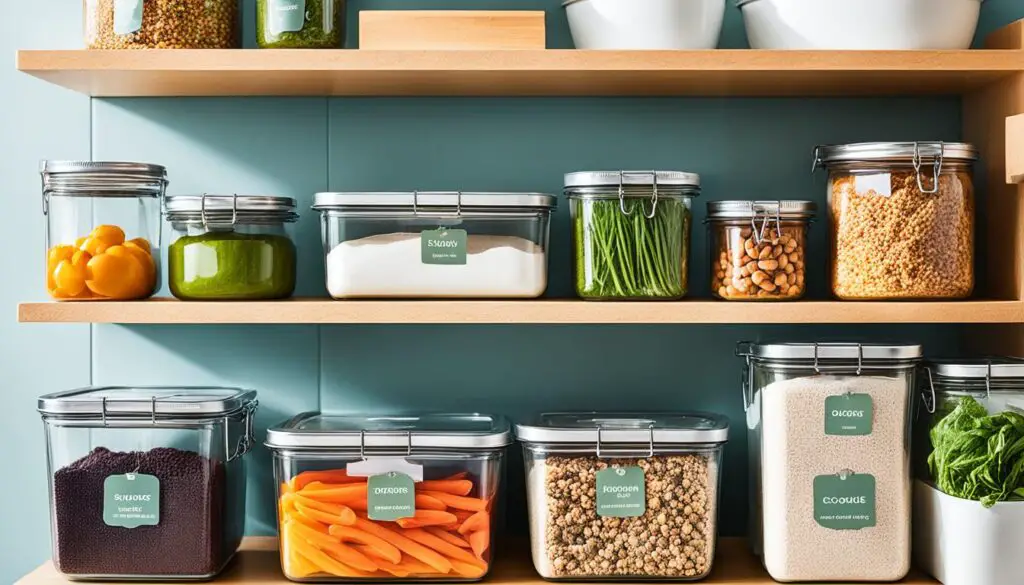Switching to zero-waste solutions is both powerful and rewarding. It not only lessens waste and our environmental impact but also cuts costs over time. I’ve made my home greener and more sustainable through zero-waste habits.
Finding eco-friendly cleaning options is vital for a zero-waste life. Using zero-waste cleaning products like feather dusters and bamboo scrubs avoids harmful chemicals and plastic waste. With brands like Blueland, switching to green cleaning is simple.
But there’s more to a sustainable home than just clean spaces. Our kitchens, for example, can create a lot of waste. To combat this, we can compost, reduce single-use plastics, and preserve food. These steps not only cut down on waste but also save money and reduce food waste.
Zero-waste living extends beyond the kitchen and cleaning. Choosing reusable items over disposables reduces our environmental footprint. Options like silicone baking mats and mason jars make a big difference. Small changes lead to a big impact on our planet.
Starting a zero-waste lifestyle can seem overwhelming, but it’s definitely worth it. Take it one step at a time, incorporating new habits gradually. The key is to focus on progress, not perfection. By doing so, we can all contribute to a better, more sustainable future.
Key Takeaways:
- Switching to zero-waste cleaning products and tools can reduce waste and save money.
- A zero-waste kitchen involves reducing organic waste, minimizing single-use plastics, and adopting food preservation techniques.
- Choosing sustainable swaps for everyday items helps eliminate waste and protect the environment.
- Start small and gradually incorporate zero-waste practices into different areas of your life.
- Remember that progress is more important than perfection in leading a zero-waste lifestyle.
Creating a Zero-Waste Kitchen
Making your kitchen zero-waste is a big step towards living more sustainably. By cutting down on waste and using eco-friendly options, you help the environment and save money. Let’s dive into how you can make your kitchen greener and share some useful tips.
The Importance of Sustainable Food Storage
Sustainable food storage is key to a zero-waste kitchen. Ditching single-use plastics and excessive packaging cuts our environmental impact. Reusable containers keep food fresh longer and are better for Earth.
Use glass or stainless-steel containers for leftovers and packed lunches. They’re safe, durable, and don’t have plastics’ chemicals. Mason jars work well for pantry storage, spices, and sauces.
Reducing Organic Waste through Composting
Composting is a big part of having a zero-waste kitchen. You can turn food scraps into rich compost for plants. This reduces landfill waste and cuts greenhouse gas emissions.
Start a compost bin in your kitchen or a compost pile in your yard. Compost things like fruit peels, coffee grounds, and eggshells. Don’t compost dairy or meat, as they attract pests.
Smart Meal Planning and Grocery Shopping
Planning meals and shopping wisely are essential for reducing waste. Plan your meals and make a detailed list before grocery shopping. This avoids buying too much and reducing food waste.
Shop at farmers’ markets or join a CSA to support local farms. Buying in bulk with your containers also minimizes waste. It helps you store grains, nuts, and spices without extra packaging.
Preserving Food for Extended Shelf Life
Preserving food extends its shelf life and lets you enjoy seasonal foods all year. Techniques like pickling, dehydrating, and freezing are great for keeping foods longer.
Try making your pickles or jams with extra produce. Dehydrating fruits and veggies makes tasty, long-lasting snacks. Freeze herbs and leftovers in small containers for easy future meals.
The Cost-Saving Benefits of a Zero-Waste Kitchen
Going zero-waste saves you money and helps the planet. Spending less on food, using reusable products, and smart shopping cut costs over time.
Every time you prevent food waste or switch to reusables, you save money. Less consumption means lower food bills and fewer shopping trips. It’s a win for both your wallet and the environment.
Adopting these zero-waste habits makes your kitchen eco-friendly and sustainable. It’s amazing how our choices can positively affect the environment. Let’s do our part!
Sustainable Swaps for a Zero-Waste Lifestyle
Switching to sustainable items is a big step towards a zero-waste lifestyle. By choosing better alternatives, we can cut down our impact on the planet. This section will guide you through making eco-friendly choices in areas like the kitchen, cleaning, personal care, and storage.
Kitchen
The kitchen is a great place to start making changes. For cooking, replace aluminum foil with reusable silicone baking mats. They save money and reduce waste as they can be used over and over. Use real utensils instead of ones that break, opting for stainless steel for longer use. For keeping food fresh, use mason jars or silicone bags instead of disposable containers.
Cleaning
Cleaning products can hurt the environment. Choose eco-friendly sprays without harmful chemicals. Pick products that are safe for the planet and your home. Instead of using paper towels, use cloth towels from materials like organic cotton. This swap helps save money and cuts down on waste.
Personal Care
Make your personal care routine more sustainable too. Use a bamboo toothbrush instead of a plastic one. Bamboo is better for the environment. Try shampoo bars instead of bottles to reduce plastic use. When picking skincare, choose products with little or no packaging and natural ingredients.
Storage
For storage, avoid plastic bags by using silicone bags or beeswax wraps. They are great for keeping snacks and leftovers. Glass containers are perfect for meal prep, helping you avoid disposable packaging. These changes help you organize while being kind to the planet.
Adopting a zero-waste life is easier than you think. With simple swaps like these, anyone can help shape a sustainable future. Let’s embrace these changes together and advocate for a waste-free world.
Conclusion
Choosing a zero-waste lifestyle is both a smart and rewarding choice. It helps the earth and future people. In this article, we’ve looked at ways to cut down on trash. We also talked about how to live more sustainably every day.
By using zero-waste tips for a green home, we can help the environment a lot. Making a zero-waste kitchen and choosing eco-friendly options are powerful actions.
It’s the little steps that truly matter. Begin with one zero-waste habit and then add more as you go. Aim for progress, not perfection, and be proud of each positive step.
Let’s all be part of the zero-waste effort for a brighter tomorrow. Use what you’ve learned from this article to encourage others. If we work together, we can create change.



